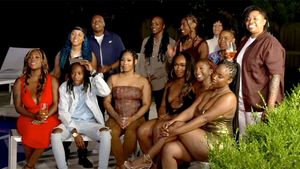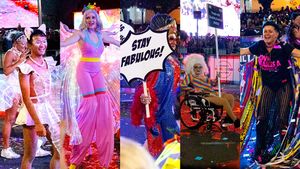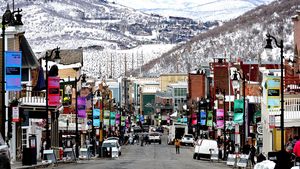Marc Chen says he didn't think he'd make it to the age he is today.
The 63-year-old has been living with HIV for 42 years now. He's also a cancer survivor. He’s one of the growing number of older adults who live with HIV. In fact, half of all people living with HIV are 50 and above. According to research, that proportion will be 70 percent by 2030.
Keep up with the latest in LGBTQ+ news and politics. Sign up for The Advocate's email newsletter.
That same age group accounts for 17 percent of new HIV diagnoses each year, reports SAGE, an organization that assists older LGBTQ+ adults. LGBTQ+ elders face additional challenges if they acquire HIV. SAGE notes that many queer elders live alone, are financially insecure, and lack trust in the U.S. health care system. Moreover, 75 percent of them have another health condition affecting them.
Chen told The Advocate ahead of HIV/AIDS and Aging Awareness Day that he and others living with HIV have to be aware of both how HIV affects their body and how aspects of aging impact their bodies and their diagnoses.
“Not only do we have to deal with aging, you know, the body, but then we have to deal with the progression of the condition,” Chen explained. Chen has been using a program from SAGE geared toward those with HIV called SAGEPositive.
Thanks to new medications and treatments for HIV, the virus is no longer a death sentence, but it’s led to issues in the health care system and a gap in training for medical professionals. It’s also led to less awareness about HIV and transmission.
Related: Stigma around those living with HIV is declining, but maybe not for the reasons you'd think
Terri Wilder is SAGE's HIV/AIDS aging policy advocate. For decades, she’s worked with patients with HIV. Older adults living with HIV suffer from higher rates of isolation and loneliness, Wilder said.
“We know that older people experience [isolation and loneliness] even without HIV, but think about what happened to these folks who were diagnosed in the ’80s,” she told The Advocate. “They lost a tremendous number of friends and larger community because of the HIV epidemic. We didn't have effective treatment until starting around 1996, and so you've got this entire kind of community that all their friends died.”
In urban areas, entire neighborhoods were devastated by HIV and AIDS.
Older people living with HIV also face health issues unlike those of their peers. Wilder and Chen both note that HIV increases the comorbidities older adults face but at an earlier age. That’s because of how HIV affects the body, Wilder explained.
Right now there aren’t enough gerontologists who can adequately support the number of older adults living with the virus, she added. Nobody planned in the ‘80s and ‘90s for people with HIV to live decades after first being diagnosed.
“Now we have this kind of interesting challenge, ‘Oh my God, all of our friends are living, but we don't have enough gerontologists to take care of people,’ and we certainly don't have people that are kind of cross-trained,” Wilder said. “And what I mean by that is medical providers who've worked in HIV for a very long time didn't think their clients were going to live either. So there wasn't really a need to be trained in aging or gerontology. So now we're kind of at this crossroads where our HIV providers know HIV, but they don't know a whole lot about aging. Of course, there are exceptions for sure, but then we've got gerontologists who were trained in aging, but maybe they've never had referrals along for people with HIV.”
Wilder said this materializes in challenges related to geriatric screenings such as frailty screenings, bone density, and cognitive testing.
Other issues that affect these elders include access to housing and potential stigma over their status when it comes to retirement homes. It’s why Wilder said there need to be more states passing LGBTQ+ and HIV long-term care bills of rights to protect these individuals.
“One, it protects people from being denied admission into a facility based on sexual orientation, gender identity, or the fact that they're living with HIV. We certainly have documentation that that still happens, and we also know that it protects people in the facility from being discriminated against or treated poorly, and then it also requires staff to be trained on HIV and also an LGBTQ+ cultural competency,” she explained. It also provides an obvious legal connection. “If you look at some of these [human rights] laws, it's not granular enough. It doesn't, like, unpack it enough where a lawyer could literally point and say there's this piece of legislation that says you can't discriminate against LGBTQ+ people or people with HIV in long-term care.”
“There's a direct thought that we could link, that somebody can use that as a tool for advocacy,” she continued. “So it's not only a legal tool, but it's also something that the resident or their family or their friends or their spouse can use as a tool to be, like, you can't treat this person this way or you can't deny them admission.”
The end of stigma against those with HIV needs to be intersectional, Wilder said, and that intersectionality needs to include age.
“If you're queer, you have HIV, you're a person of color, and you're 75, that's a lot of potential for intersectional stigma and discrimination, and so that coming at you all the time is really stressful,” she said. Older people who are diagnosed with HIV are more likely to be diagnosed with advanced disease, meaning a co-diagnosis of HIV and AIDS, Wilder said.
“I think the thing what’s even more terrifying to me is that people actually have died because we don't think about older people in HIV prevention, we don't think about older people and sexual health needs, so people are not — when I say people, I mean health care providers outreach workers that do HIV testing — they're not necessarily thinking about older people and offering older people HIV tests. We have stereotypes about older people: ‘Oh, older people don't have sex. They're asexual. Older people don't use drugs.’ Those kind of things. And that's not true. We know that older people are vulnerable to HIV.”
These issues are why programs like SAGEPositive exist.
Chen has been involved with the program for years. They call and check in on him. Recently, a friend of his who also is living with HIV got in bad shape, but SAGEPositive helped the friend get a walker and also to make the person’s apartment more accessible, he noted.
“I'm so glad they're around because these are folks that care about you, that understand you, and are there for you without any kind of judgment, and it's just a really nice, you know, brotherhood and sisterhood that we embrace, that we should in our community,” Chen said.
Chen added that the program also facilitates support groups, sexual health workshops, friend visits, buddy systems, HIV and STI testing, and other initiatives for people like him.
It's that support that has helped Chen continue to keep the legacy of those lost to HIV alive.
“I dealt with survivor’s guilt in the past,” Chen said. “But then I was like, wait a minute, I think I survived to tell their stories. You know, that they were here.”



















































































